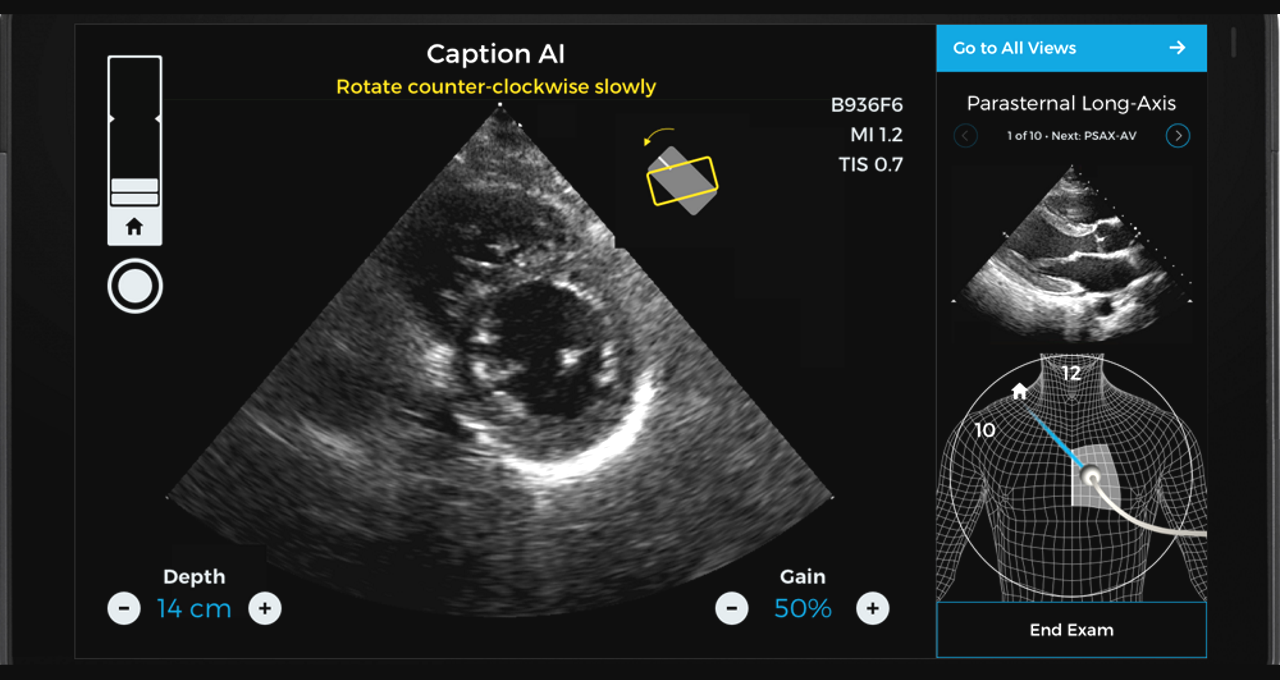A month after it got FDA approval, a startup’s first product was saving lives on the front lines of the battle against COVID-19.
Caption Health develops software for ultrasound systems, called Caption AI. It uses deep learning to empower medical professionals, including those without prior ultrasound experience, to perform echocardiograms quickly and accurately.
The results are images of the heart often worthy of an expert sonographer that help doctors diagnose and treat critically ill patients.
The coronavirus pandemic provided plenty of opportunities to try out the first dozen systems. Two doctors who used the new tool shared their stories on the condition that their patients remain anonymous.
In March, a 53-year-old diabetic woman with COVID-19 went into cardiac shock in a New York hospital. Without the images from Caption AI, it would have been difficult to clinch the diagnosis, said a doctor on the scene.
The system helped the physician identify heart problems in an 86-year-old man with the virus in the same hospital, helping doctors bring him back to health. It was another case among more than 200 in the facility that was effectively turned into a COVID-19 hospital this spring.
The Caption Health system made a tremendous impact for a staff spread thin, said the doctor. It would have been hard for a trained sonographer to keep up with the demand for heart exams, he added.
Heart Test Becomes Standard Procedure
Caption AI helped doctors in North Carolina determine that a 62-year-old man had COVID-19-related heart damage. Thanks, in part, to the ease of using the system, the hospital now performs echocardiograms for most patients with the virus.
At the height of the pandemic’s first wave, the hospital stationed ultrasound systems with Caption AI in COVID-19 wards. Rather than sending sonographers from unit to unit, which is the usual practice, staff stationed at the wards used the systems. The change reduced staff exposure to the virus and conserved precious protective gear.
Beyond the pandemic, the system will help hospitals provide urgent services while keeping a lid on rising costs, said a doctor at that hospital.
“AI-enabled machines will be the next big wave in taking care of patients wherever they are,” said Randy Martin, chief medical officer of Caption Health and emeritus professor of cardiology at Emory University, in Atlanta.
Martin joined the startup about four years ago after meeting its founders, who shared expertise and passion for medicine and AI. Today their software “takes a user through 10 standard views of the heart, coaching them through some 90 fine movements experts make,” he said.
“We don’t intend to replace sonographers; we’re just expanding the use of portable ultrasound systems to the periphery for more early detection,” he added.
Coping with Unexpected Demand Spike
In the early days of the pandemic, that expansion couldn’t come fast enough.
In late March, the startup exhausted supplies that included NVIDIA Quadro P3000 GPUs that ran its AI software. In the early days of the global shutdown, the startup reached out to its supply chain.
“We are experiencing overwhelming demand for our product,” the company’s CEO wrote, after placing orders for 100 GPUs with a distributor.
Caption Health has systems currently in use at 11 hospitals. It expects to deploy Caption AI at several additional sites in the coming weeks.
GPUs at the Heart of Automated Heart Tests
The startup currently integrates its software in a portable ultrasound from Terason. It intends to partner with more ultrasound makers in the future. And it advises partners to embed GPUs in their future ultrasound equipment.
The Quadro P3000 in Caption AI runs real-time inference tasks using deep convolutional neural networks. They provide operators guidance in positioning a probe that captures images. Then they automatically choose the highest-quality heart images and interpret them to help doctors make informed decisions.
The NVIDIA GPU also freed up four CPU cores, making space to process other tasks on the system, such as providing a smooth user experience.
The startup trained its AI models on a database of 1 million echocardiograms from clinical partners. An early study in partnership with Northwestern Medicine and the Minneapolis Heart Institute showed Caption AI helped eight registered nurses with no prior ultrasound experience capture highly accurate images on a wide variety of patients.
Inception Program Gives Startup Momentum
Caption Heath, formerly called Bay Labs, was founded in 2015 in Brisbane, Calif. It received a $125,000 prize at a 2017 GTC competition for members of NVIDIA’s Inception program, which gives startups access to technology, expertise and markets.
“Being part of the Inception program has provided us with increased recognition in the field of deep learning, a platform to share our AI innovations with healthcare and deep learning communities, and phenomenal support getting NVIDIA GPUs into our supply chain so we could deliver Caption AI,” said Charles Cadieu, co-founder and president of Caption Health.
Now that its tool has been tested in a pandemic, Caption Health looks forward to opportunities to help save lives across many ailments. The company aims to ride a trend toward more portable systems that extend availability and lower costs of diagnostic imaging.
“We hope to see our technology used everywhere from big hospitals to rural villages to examine people for a wide range of medical conditions,” said Cadieu.
To learn more about Caption Health and other companies like it, watch this webinar on healthcare startups working against COVID-19 and stay up to date with the latest healthcare news from NVIDIA.
